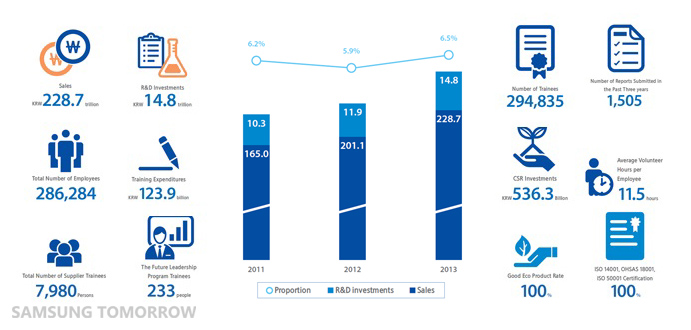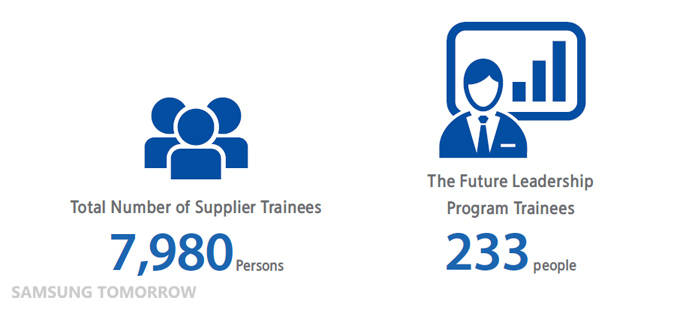Notable Numbers from the Samsung Sustainability Report 2014
Each year, Samsung publishes its Sustainability Report, which focuses on the company’s growth, people, projects, and future. But rather than just saddle you with a link to the very long report, we’ve spent some time with it, and boiled it down to exactly what you need to know. Taken from the Samsung’s Sustainability Report 2014, we want to review the essentials about Samsung Electronics as an organization by the numbers.
Creation of Economic Value
Last year, Samsung Electronics delivered record sales of KRW 228.7 trillion, an increase of 13.7 percent from that of 2012 (KRW 201.1 trillion). The company earned KRW 36.8 trillion in operating profits, KRW 29.8 trillion in net income, and KRW 53.2 trillion in EBITDA.
Despite challenges driven by delayed global economic recovery and intensified price competition of its key products, Samsung Electronics achieved record earnings by affirming market leadership in the Mobile, Memory, and OLED businesses. Its earnings are mainly comprised of Consumer Electronics (20%), IT and Mobile (54%), Semiconductors (14%), and Display Panels (12%).
Investments in Research & Development serves as a foundation of positive financial growth. In 2013, Samsung Electronics invested 6.5 percent of its sales, KRW 14.8 trillion, in R&D.
▲Sales and R&D Investments for the latest three years (Unit: KRW Trillion)
To continuously launch creative and innovative products and develop future technologies, Samsung has dedicated to supporting R&D. Along with such considerable investments, Samsung Electronics has been able to secure original, next-generation technologies.
Transparent Management
High levels of performance are built on trust and transparency. To maintain an ethical, transparent corporate culture, Samsung Electronics conducts Corruption Prevention Training tailored to different job levels, positions, and business fields at least once a year.
The training offers employees virtual experience in addressing different scenarios or situations, and helps to deepen their understanding of the need for corporate integrity and equip them to take appropriate countermeasures. The company also provides a wide range of collective, online and audiovisual training programs. As of 2013, 294,835 employees have taken the Corruption Prevention Training.
Furthermore, Samsung has been operating a website that offers information on ethical business management and provides an external reporting system since 2002. The website operates in 14 languages including English, Japanese, Chinese, and Spanish, and it is available in 69 locations around the world. The dedicated reporting system allows internal and external stakeholders to report anonymously unethical business conducted by Samsung Electronics employees.
Information submitted is reviewed and classified into different categories for action. After careful review of each reported case to verify its credibility, Samsung Electronics takes action to resolve the cases involving employee misconduct or consumer complaint. According to data collected from the website, 1,505 reports were made in the past three years. 62 percent of them consisted of consumer complaints and 38 percent were related to unethical conduct. For cases where unethical conduct is verified, the company takes disciplinary action against the employees involved.
Talent Management
Sound talent management is key to ensuring the competitiveness of the corporation. Samsung managers aim to hire and train employees according to their performance and potential. As of 2013, the total number of Samsung Electronics’ employees was 286,284. Of that figure, 97,937 new employees were hired outside of the Korean headquarters, largely at its global production subsidiaries in Asia, to meet the increasing global demand.
Samsung’s talent management strategy does not only come into play when hiring employees, but also during development and training. Samsung offers various training programs to help employees develop various competencies. The amount spent on training expenditures in 2013 was 123.9 billion and it is planned to be increased continuously.
More than 94,000 women make up 40 percent of the company’s total workforce. In 2011, Samsung Electronics announced that it would increase the number of women executives to 10 percent by 2020. By the end of 2013, women accounted for 3.8 percent of the total number of executives, a 1.4 percent increase from 2012.
Also, since 2011, Samsung Electronics has been conducting an open recruitment for people with disabilities, offering work opportunities through its ‘Stepping Stone Internship’ program. Through various hiring programs, the number of employees with disabilities at Samsung increased 1.6-fold to 1,377 in 2013 in Korea, compared to 838 in 2010.
Social Contribution
Samsung Electronics is committed to spreading a culture of sharing with the community. To match diverse local needs, the company expanded its Corporate Social Responsibility programs and invested KRW 536.3 billion in total last year.
As for Global CSR Programs, Samsung contributed KRW 32.8 billion to operate 383 Smart Schools, one of its leading CSR programs in the education sector. It also contributed KRW 6.5 billion to run 23 Tech Institutes, vocational support programs for youth. The Solve for Tomorrow program was administered in the U.S. and China with an investment of KRW 11.7 billion, while the Health and Medical program was supported in China, the CIS, and Africa with an investment of KRW 6.7 billion. The Nanum Village program was offered in Africa and Latin America with an investment of KRW 4.4 billion.
In addition, 282,840 employees donated their time for a total of 1,063,835 volunteer hours, 11.5 hours on average per employee.
Shared Growth with Suppliers
To continue to strengthen partnerships with its suppliers, Samsung Electronics established the Mutual Growth Academy in July 2013, which provides systematic and professional training support for supplier employees.
As a part of the Mutual Growth Academy, Samsung Electronics launched leadership and global education programs, in addition to existing manufacturing and production technology programs. In an effort to enhance its suppliers’ competitiveness, Samsung Electronics also significantly expanded training programs on specialized technologies.
Launched in 2004 for partner companies, the Future Leadership Program consists of hands-on training in a number of Samsung Electronics divisions and visits to the company’s overseas subsidiaries. The program provides an invaluable opportunity to train future leaders while promoting future operational excellence among its key suppliers.
Green Management
As a responsible corporate citizen, Samsung Electronics is sharply aware of the growing environmental impact associated with the sourcing, manufacturing, use, and disposal of electronic products. The company’s Green Management philosophy, which prioritizes the future health of people and the planet and mandates environmentally responsible practices throughout Samsung’s operations, drives the company’s environmental sustainability initiatives.
In 2013, Samsung Electronics raised its Eco-Product development ratio to 100 percent and improved its product efficiency by 42 percent on average, compared to 2008. These accomplishments can be attributed, in part, to the company’s 2009 implementation of a comprehensive Eco-Product rating system and continued promotion of the development of low-carbon products. Samsung Electronics receives a number of major eco-marks and carbon-labels for its outstanding accomplishments to improve electronic product energy efficiency. As a result of its unique eco-management initiatives, Samsung Electronics has an unparalleled competitive edge in various markets.
All of Samsung Electronics’ global operation sites have received certification from international EHS management systems such as ISO 14001 and OHSAS 18001. Samsung Electronics maintains its world-class EHS certification by fulfilling all requirements for post-evaluations and re-certification audits. In 2013, Samsung Electronics received the ISO 50001 certification for its energy management systems at all of its operation sites.
That pretty much sums up the essentials of the Samsung Sustainability Report 2014. We will bring more interesting facts from the report as we go along. In the meantime, for more details, check out the Sustainability Report 2014. Thanks!
Press Resources > Press Release
For any issues related to customer service, please go to
Customer Support page for assistance.
For media inquiries, please click Media Contact to move to the form.







